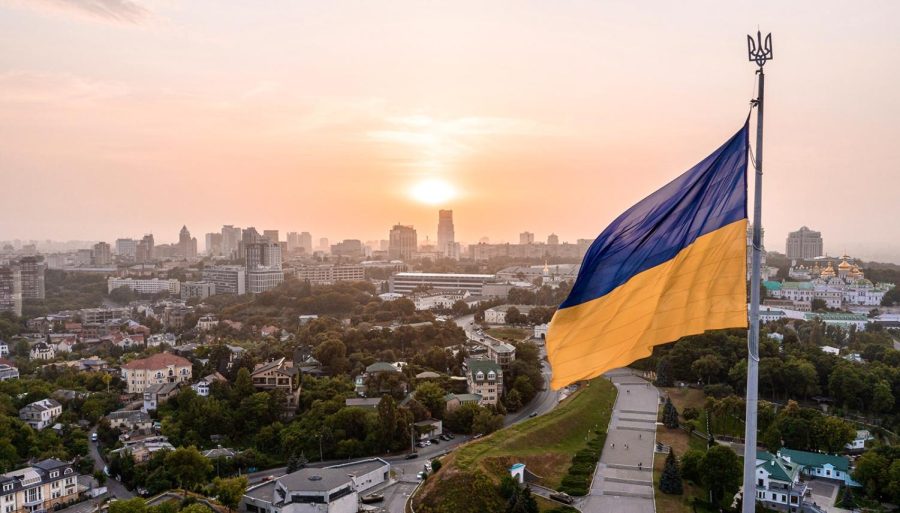Ukrainians Need Support with No-Strings-Attached
Providing resources to Ukrainians in need is important – but it needs to be done in a sensitive manner. The Lubetzky Family Foundation’s Global Democracy Ambassador Scholarship is one new program that tries to support Ukrainians, giving 10 displaced college-aged Ukrainians $30,000 each to attend a university in the U.S. and participate as “democratic ambassadors.” According to the website, there are two phases: the first supports students already pursuing a degree for the 2022-23 school year, and the second will support students expected to study abroad in the U.S. in 2023. Although this program is relatively new and little information is available on it, if its Ukrainian scholars are given a platform it will be extremely effective in educating Americans about Ukraine and benefiting the war-torn country.
This new program allows Americans to understand the many misconceptions about Ukraine through Ukrainians’ perspectives. For instance, many argue that Ukraine is already practically Russian because of the large Russian-speaking population. This mindset ignores the history of bans on the Ukrainian language during periods of Russian colonial occupation. The fact that Ukrainian culture has been under attack for so long does not mean that those who were forced to adapt the Russian language for survival or relearn the art of pysanky making are any less Ukrainian. In contrast, the continuation of Ukrainian culture despite Russification is proof of Ukrainians’ desire for self-determination. There are many more misconceptions about Ukraine, ranging from Ukraine being a political pawn of NATO to the common Russian propaganda that Ukraine is run by nazism. However, by giving Ukrainians a platform to truly speak about their survival as a country despite systematic erasure from foreign influences, these misconceptions can be combated.
Since the program has just begun, we cannot know what restrictions are placed on the 10 new “ambassadors of democratic values.” This scholarship program has the potential to do more harm than good if the scholars are forced to equate America’s fight for “democracy” to Ukraine’s war. When speaking about the program, founder José Andrés said, “[Scholars] represent the Frontline of Freedom and can remind American students who are their roommates and classmates, that democracy is worth fighting for.”
Democracy is worth fighting for, but Ukraine’s democracy is notably different from America’s. America is a very imperialistic country, and the “fight for democracy” mindset has led the U.S. government to carry out many acts of violence in other countries. American involvement in the Middle East, Vietnam and the Philippines are just a few examples of our sense of superiority in the international community and the imperialistic practices we as a country continue to perpetuate.
It is important that we, as Americans, do not attempt to turn Ukraine into another political pawn. Ukraine is its own country, with just as interesting and valid a culture as America’s and just as important a history. We need to recognize this distinction and not invest in Ukraine for the sake of expanding our influence in the East. Ukrainians are not a pawn of Western political powers. Ukraine deserves self-determination from both Russia and America. Hence, Western support should not be treated as an expansion of Western imperialism.
America forces other countries, such as Ukraine, under its influence financially. “With a monthly fiscal shortfall of $5 billion, Ukraine is heavily reliant on foreign financing from Western allies,” according to Reuters. Given Ukraine’s economic losses, Ukraine will not be capable of paying its large debt towards the West anytime soon. Essentially, once Ukraine gains its independence, America will still have influence over Ukraine. To provide Ukraine with the freedom that it deserves, America needs to provide support with a no strings attached mindset. A no-strings-attached mindset is the only way to fully support and encourage Ukraine’s right to self-determination, and it is also one America agreed upon in the Budapest Memorandum, which states “the United States of America reaffirm their commitment to seek immediate United Nations Security Council action to provide assistance to Ukraine…if Ukraine should become a victim of an act of aggression.” I would like to emphasize that it is still crucial that we send support and weapons to Ukraine. In exchange for Ukraine’s third largest supply of nuclear weapons after the Soviet Union collapsed, America agreed to support Ukraine’s right to self-determination. We need to follow through on our treaties and provide unconditional support to Ukraine.
So how likely is the scholarship program to respect Ukraine’s right to self-determination? Will it merely continue America’s imperialistic practices? One way the program could be improved upon would be to directly fund schools in Ukraine. This direct focus on Ukrainian education would be more beneficial than having an indirect one, where Ukrainians are being educated in America. Overall, however, given the genuine effort the founders have put into Ukraine as well as the scholarship’s emphasis on returning the Ukrainian scholars back to Ukraine, this program will likely give the support, financial assistance and resources that Ukrainians desperately need.
Right now, Ukrainians are facing horrors that many of us cannot comprehend. Ukrainians have been displaced, raped and murdered by the imperialistic mindset. Death, erasure and war are part of Ukrainians’ everyday life. Ukrainians are strong and capable, but they are still in need of our support. Programs such as the Global Democracy Ambassador Scholarship provide the much needed financial and moral support that we, as Americans, owe to Ukraine, a country fighting for all of Europe’s stability right now. We should continue to give to Ukraine without expecting any political influence or sway within the country in return and remember to let Ukrainians speak and act for themselves. Slava Ukraini.
Sofika Levytsky, FCRH ’26, is undecided from Parsippany, N.J.










































































































































































































